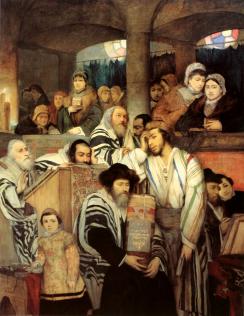Every week, parshaoftheweek.com brings you a rich selection of material on parshat hashavua, the weekly portion traditionally read in synagogues all over the world. Using both classic and contemporary material, we take a look at these portions in a fresh way, relating them to both ancient Jewish concerns as well as cutting-edge modern issues and topics. We also bring you material on the Jewish holidays, as well as insights into life cycle rituals and events...
One of the major features of the High Holiday period, culminating in Yom Kippur, is the tradition to try and patch up whatever bad feelings may exist between friends, family, colleagues, and acquaintances. To make this happen, it is customary to ask forgiveness of those we may have, or definitely have, wronged, insulted, or hurt. Of course, when real, measurable, tangible damage has been done, simply saying you’re sorry is not enough; restitution must also be made, the damage must be repaired. But when feelings have been hurt, or we have been nasty, unfeeling, or insensitive, at this time of year we try to make it good by saying we are sorry, and asking for – and, when asked, granting – forgiveness.
This custom has reached gargantuan proportions here in Israel, with many TV and radio shows, as well as online sites, setting up virtual “I’m sorry, please forgive me” festivals between political rivals, minor celebs, members of the press, artists, and other newsworthy individuals. This past Friday afternoon I heard an hour of songs on the radio based on the “I’m sorry, dear, so sorry dear” theme; it’s ubiquitous, and actually very nice. After all, what could be bad about saying you’re sorry, forgiving those who ask you to, and, in general, improving our relationships with those around us?
A trickier feature of the High Holidays is one of the most difficult, and well known, elements of Yom Kippur: the Kol Nidre prayer with which we begin services on the eve of the holy day. Kol Nidre is not, essentially, a prayer. Rather, it is a legal statement, in which we nullify any and all oaths and promises we made last year, and will make in the year to come. Why we need to do this at all, and why this procedure has such a prominent role in the liturgy, is an old question. Of all the things with which we could open this holiest day of the year, why choose a legal formula for the nullification of oaths?
Another obvious problem with Kol Nidre is that we keep on, year after year, breaking our promises. The annual saying of Kol Nidre indicates that we need help in the keeping our word department: we know that we need to nullify all oaths and assurances, because we keep breaking them! What is that about? Are we really so untrustworthy? So false? So weak?
Perhaps we can explain the centrality and popularity of the Kol Nidre prayer by understanding it in terms of the dynamic of asking forgiveness. After all, who, exactly, do I wrong when I fail to live up to my promises? Who, exactly, is hurt, when I say I will, or won’t, do something, and then don’t follow through? Well, in certain circumstances, there may be an individual, or individuals, to whom I have made promises – ‘I’ll take care of that for you’; ‘I won’t do that again’; ‘Don’t worry, I’ll do it’ – and whom I then have let down. But, on many occasions, it is I myself whom I have wronged when I fail to live up to my word. When I don’t do what I swore to myself I would do, or when I behave in a way I promised myself I wouldn’t. These oaths are our attempts to tell ourselves what we should and should not be doing with our lives, and when we fail, we are, first and foremost, letting ourselves down.
It follows, then, that Kol Nidre is the opportunity each of us is given ask ourselves for forgiveness, and to grant it. To recognize that we have failed to live up to whom we say we are, or want to be, and say we are sorry. To push the reset button and start again, with a clean slate, having nullified all oaths, all promises, and thereby forgiven ourselves, and then try, one more year, to live up to whom we claim to be, knowing that we may well, once again, come up short. Kol Nidre is the act of recognizing that we have let ourselves down, by not living up to what we said we would do, and not becoming who we promised ourselves we could be. We recognize these failures, and then tell ourselves it’s all right, we can, by nullifying our oaths, wipe the slate clean and start again, hopeful that we will live up to our best aspirations, but knowing that we may well, again, once again, fail to do so, and that will be OK, because we have, with the Kol Nidre, forgiven ourselves.
May you be inscribed in the book of life for a sweet and wonderful year.
Rabbi Shimon Felix



Get inspired by Yom Kippur Divrei Torah from previous years